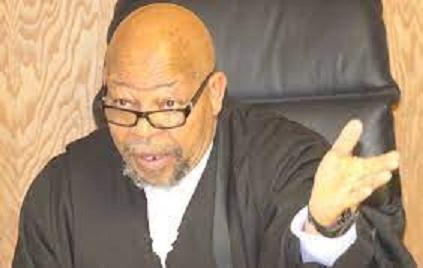Africa-Press – Lesotho. HIGH Court Judge Tšeliso Monapathi has given Frazer Solar 14 days to respond to Prime Minister Moeketsi Majoro’s application to nullify the award of £50 million (M856 million) damages to the German company.
The damages are for the government’s alleged breach of the two parties’ M1, 7 billion 2018 deal for the supply of solar power to Lesotho. Justice Monapathi issued the order on 1 November 2021 in response to the government’s application on the matter. Advocate Motiea Teele appeared on behalf of Attorney General Rapelang Motsieloa who instituted the application on behalf of the government.
The application, which is in addition to his pending lawsuit in South Africa’s Gauteng High Court, is a clear indication that Dr Majoro is pulling out all the stops in his quest to reverse the controversial deal which could cost the country as much as 2 percent of its gross domestic product.
In his application filed on 21 September 2021, Dr Majoro wants the Lesotho High Court to nullify a 2019 South African arbitration award of damages to Frazer Solar.
The damages are for the government’s alleged breach of the 2018 contract the German company claims to have entered into with the previous Thomas Thabane-led government for the supply of solar power to Lesotho over four years.
Justice Monapathi on 1 November granted the government condonation for the late filing of its application against the damages award and further ordered that if Frazer Solar intends to oppose the application, it should do so within 14 days of being served with his order.
South African lawyer, Nicole Rebecca Gilfelleon, will represent Frazer Solar in the application, hence Justice Monapathi’s order will be served in South Africa and not Germany where the company is based.
In his court papers, Dr Majoro argues that Lesotho cannot be held liable for an agreement that was clearly founded on “falsities”. “The Kingdom cannot be bound to an agreement that includes an undertaking and clauses that are clearly false and known to the parties that purported to sign the agreement,” Dr Majoro states.
“It will be against public policy to hold the Kingdom to an agreement that is clearly founded in falsities and was concluded with the ulterior purpose of creating obligations that the Kingdom would have already breached as soon as the agreement was concluded.
Significantly, I note that these breaches are what Frazer Solar relied upon in its claim against the Kingdom in the arbitration. ” Dr Majoro savages former Minister in the Prime Minister’s Office, Temeki Tšolo, for “fraudulently and corruptly” signing the botched deal on behalf of the government.
Dr Majoro says he had no right to negotiate and sign such an agreement. Mr Tšolo has previously denied signing the deal on behalf of the government. However, Dr Majoro insists that he signed and, in the process, violated national laws which stipulate how such contracts are agreed and how payments to third parties are made.
He accuses the former minister of acting outside his powers by “clandestinely” signing the agreement without the knowledge and approval of parliament, cabinet and himself as the finance minister at the time.
“Mr Tšolo did not notify the chief accounting officer nor did he inform the Ministry of Finance of the supply agreement before it was signed. Minister Tšolo acted alone.
Minister Tšolo also breached regulation 32(b) (of Public Procurement Regulations) when he decided to act alone to commit the Kingdom to a €100 million (M1,7 billion) financial commitment.
There can be no doubt that the purported conclusion of the supply agreement was unlawful and invalid for failure to comply with the Public Procurement Regulations.
“Minister Tšolo undertook to commit the Kingdom to the financing agreement without parliament’s approval.
In light of the provisions of the constitution and statutory framework, it could never be permissible for a minister in the Office of the Prime Minister to conclude an agreement of the nature of the supply agreement concluded by Minister Tšolo.
“He acted unlawfully and beyond his powers and abused his discretion when he concluded the agreement without the approval or cooperation of the Minister of Finance, parliament, cabinet or the procurement unit.
A reasonable member of cabinet who is not a finance minister would never commit the Kingdom to a loan of €100 million. “Minister Tšolo acted in bad faith to the detriment of the Kingdom for the exclusive benefit of a foreign entity.
He was acting in pursuit of a purpose other than to protect the interests of the Kingdom. Minister Tšolo was not advancing the public interests of the Kingdom.
His actions in appointing Frazer Solar and concluding the supply agreement were unreasonable and fall to be reviewed and set aside,” Dr Majoro argues. He further argues that the deal should have been negotiated and signed by the Ministry of Energy and Meteorology, not by Mr Tšolo.
For More News And Analysis About Lesotho Follow Africa-Press






